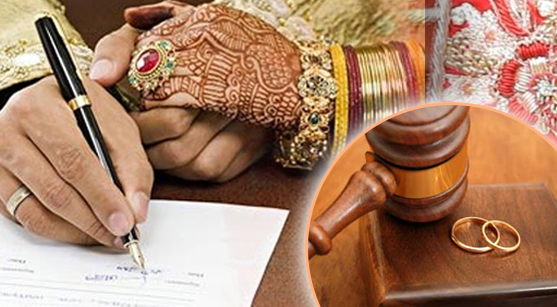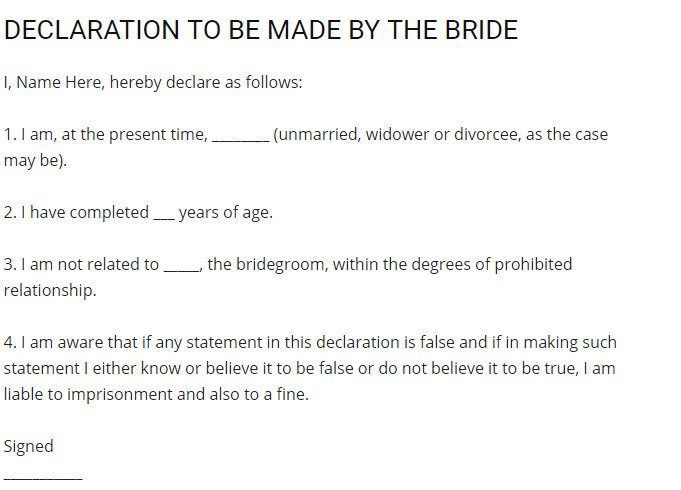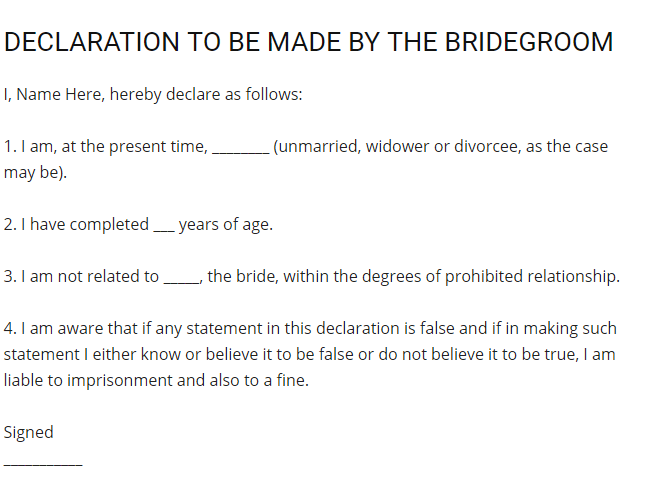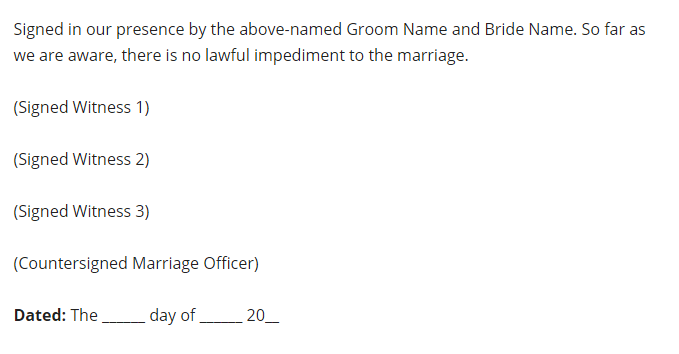 Court marriages are very different from traditional Indian marriages. They are solemnized under/following the Special Marriage Act, 1954 (from now on ‘the act’).
Court marriages are very different from traditional Indian marriages. They are solemnized under/following the Special Marriage Act, 1954 (from now on ‘the act’).
In the procedure, the marriage can take place or be solemnized in the court itself in the presence of a Marriage Officer and three witnesses. These marriages do not have an elaborated ritualistic ceremony of the personal laws of the parties to the marriage. Simply marrying in the presence of a Marriage Officer following the act is sufficient for a valid marriage.
Section 18 in The Special Marriage Act, 1954 states that –
“Subject to the provisions contained in sub-section (2) of section 24, where a certificate of marriage has been finally entered in the Marriage Certificate Book under this Chapter, the marriage shall, as from the date of such entry, be deemed to be a marriage solemnized under this Act, and all children born after the date of the ceremony of marriage (whose names shall also be entered in the Marriage Certificate Book) shall in all respects be deemed to be and always to have been the legitimate children of their parents: Provided that nothing contained in this section shall be construed as conferring upon any such children any rights in or to the property of any person other than their parents in any case where, but for the passing of this Act, such children would have been incapable of possessing or acquiring any such rights by reason of their not being the legitimate children of their parents.”
Some Questions Regarding the Court Marriage
What’s a Court Marriage
Court Marriage means legal authorization of marriage between two people belonging to two different religions, according to the Special Marriage Act 1954. Even those who belong to the same religion may also choose court marriage.
Can marriage be registered Online?
No, marriage registration cannot be done online. The physical presence of both the parties are required in front of the marriage registrar
Is the Parent’s approval needed for Court Marriage?
No. There is no need for parents’ approval of court marriage.
How many Witnesses are required in Court Marriage?
Although you will be getting married on your consent in the presence of the marriage officer, you will need to have at least three witnesses at the ceremony.
Can you marry a Foreign national?
If you or your partner are of the opposite sex and legal age, you can marry anyone you want. However, the procedures to marry a foreign national is a bit different. The detailed explanation is given below.
Detailed Explanation of Procedure of Court Marriage in India
Who can marry through Court Marriage procedures?
Any two individuals of different genders, of same or different caste or religion can marry through court marriage procedure.
Essential Conditions for Court Marriage:
Chapter II, Section 4 of the act provides the following conditions
- Either person must not be married to other living parties.
- The bride must have attained the age of 18 years and the bridegroom, 21 years
- Any of the persons must not be of unsound mind or suffer from insanity.
- The parties must not be within degrees of prohibited relationship.
Procedure when both parties are Hindus:
- Notice of the intended marriage – The couple must file note for the intention of marriage to the district court where he or she resided at least 30 days before the notice.
- Publication – The notice is, then, publicized by the Registrar for Marriage to invite any objections.
- Objection to Marriage – 30 days after the notice is put up; the marriage may be solemnized if no complaints have been raised.
- Declaration by Parties and Witnesses – Three witnesses and both parties are required to be present at the event of solemnization.
Then declaration is made by Bride and Groom.
Declaration done by Bride:

Declaration done by Bridegroom:

Signatures required for Court Marriage

- Place and form of Solemnization –The marriage shall be binding only when each party in the presence of the Marriage Officer and the three witnesses says to the other party in any language understood by the parties.
- Certificate of Marriage –The marriage officer enters a certificate in the form specified in Schedule IV of the act in the marriage certificate book. If signed by both parties and three witnesses, such a certificate is conclusive evidence of the court marriage.
A Sample of Marriage Certificate

Under Section 13(2) in The Special Marriage Act, 1954
On the certificate being entered in the Marriage Certificate Book by the Marriage Officer, the Certificate shall be deemed to be conclusive evidence of the fact that a marriage under this Act has been solemnized and that all formalities respecting the signatures of witnesses have been complied with.
Documents Required For Court Marriage:
- Application form in the prescribed format with necessary fee.
- Residential proof of the couple.
- Passport size photos of the couple.
- Proof of date of birth of the couple.
- PAN card and residential proof of three witnesses.
- Divorce decree or death certificate of the former spouse as required.
Procedure when both Parties are of Different Religions:
The marriage under the Special Marriage Act 1954 is a civil contract and hence does not need any ceremonies or rites. When either spouse or both are not Hindus, this procedure is invoked.
Documents required and procedures are the same.
Court Marriage between an Indian National and a Foreigner
Marriage between a foreign national and Indian national can be solemnized by an Indian Marriage Registrar or a marriage officer in a foreign country.
Eligibility:
- One partner must be a citizen of India.
- The groom must have attained 21 years of age and the bride 18 years of age.
- Neither party must have a living spouse already.
- Neither party must be a sufferer.
- Neither party must be within degrees of prohibited relationship.
- Either party should not have any other valid marriage.
Documents Required:
- Application signed duly by the parties.
- Evidence in documents of the date of birth of the parties.
- Passport Copy of the parties with valid visas.
- Proof of residence of both parties.
- Evidence of stay of more than 30 days in any district in India of either one party.
- No Objection Certificate or certificate of marital status from the particular embassy or Indian consulate must be furnished by the foreign partner.
- Divorce decree or death certificate whichever is applicable regarding the former marriage of any party.
Procedure:
The first few steps are the same. All documents need to be verified by the Marriage Registrar Office. Care is taken to ensure the laws of other nation are not in conflict with Indian laws. The notice is publicized as usual to invite any objections. After that marriage is solemnized with three witnesses and Marriage Certificate is granted by the Marriage Registrar.
Complexities One Faces In A Court Marriage?
Some complexities that one faces in a court marriage are as follows:
-
- Date for registering the Marriage will depend on the Marriage Officer as to what date he allots the same for appearance and solemnisation of the court marriage. And the date will be allotted 30 days after the notice is published.
- A relevant objection can stall the marriage for a long time and the decision depends on the determination of the Marriage Officer.
- The whole process has to be done manually
- One has to be residing in a place for a minimum of 30 days for being eligible
- The documents required, the fees to be paid and the persons appointed as Marriage Officers differ from place to place.
- If the marriage is not conducted within 3 months from the date of giving the notice then the notice lapses and a fresh notice is to be given to the Marriage Officer
How Long the entire process of Court Marriage takes to be completed?
The entire procedure, starting from the very first step (giving notice), takes maximum up to 60 days. Provided that no objection comes up within 30 days from the date of publication of the notice.
Advantage of doing Court Marriage
-
- It is simpler and less expensive
- The couple has the option of solemnising the marriage in any way they want.
- The married couple doesn’t have to reapply for registration of the marriage.
- The marriage certificate is conclusive proof of the marriage between the parties and there is no necessity to prove it otherwise by evidence.
Advocate in Chandigarh has considerable experience in dealing with Court Marriage procedures. We help the couple to complete the procedure of court marriage and procure the marriage registration certificate from the registrar on the same day.
If you would like to contact us for any guidance or assistance, please call us at 9914328749 or email us using [email protected]

